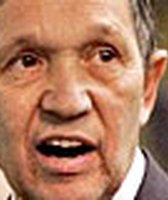Stand up for the facts!
Our only agenda is to publish the truth so you can be an informed participant in democracy.
We need your help.
I would like to contribute
SUMMARY: Mitt Romney has consistently opposed gay marriage, but he changed positions on a constitutional amendment on civil unions.
As a Republican seeking office in the liberal state of Massachusetts, Mitt Romney has had to walk a fine line on the social issues that are important to Republican conservatives. He has sought support from gay Republicans and said the Clinton administration's "don't ask, don't tell" military policy was "a step in the right direction."
But he has consistently opposed gay marriage throughout his public career, and more recently has toughened his stance to support an amendment to the U.S. constitution to prevent gay marriage. In a Sept. 14, 2007 interview on MSNBC, he said, "I have not changed my position on the marriage amendment or anything else related to marriage that ...you know, I think the New York Times said that I had changed my tone."
Here's a look at his comments over the years:
In 1994, as a candidate for the U.S. Senate in Massachusetts, he told a Boston-area gay newspaper that the definition of marriage was a "state issue as you know -- the authorization of marriage on a same-sex basis falls under state jurisdiction."
During his Senate race, Romney wrote in a letter to the Massachusetts branch of the Log Cabin Republicans, "I am more convinced than ever before that as we seek to establish full equality for America's gay and lesbian citizens, I will provide more effective leadership than my opponent." He promised the group that he would support laws preventing discrimination against gays and lesbians in the workplace and implied his hope for the eventual full integration of gays in the military.
But even in 1994, he clearly expressed his opposition to legalizing same-sex marriage, telling the Bay Windows newspaper that he backed the current governor's position that the law should only uphold male-female marriages.
In 2002, when he was governor, his wife, son and daughter-in-law signed a petition supporting a proposed amendment to the Massachusetts constitution, that would not only ban the state from recognizing same-sex marriages, but further stated, "Any other relationship shall not be recognized as a marriage or its legal equivalent, nor shall it receive the benefits or incidents exclusive to marriage."
But Romney quickly expressed his opposition to the amendment, saying that although he believed marriage was between a man and a woman, the language barring civil unions was "too extreme," with his spokesman telling the Boston Globe, "Mitt does not support it. As far as Mitt is concerned, it goes farther than current law, and therefore it's unnecessary."
Yet in 2003, when the Massachusetts Supreme Court ruled that same-sex couples could be married in the state, Romney urged the legislature to adopt a constitutional amendment banning the practice. He has since supported a similar amendment to the U.S. Constitution, despite the fact that the congressionally proposed constitutional amendment includes language similar to the 2002 Massachusetts ballot proposal that he opposed.
In that same MSNBC interview, Romney tried to turn the tables on his Republican rivals -- who have accused him of flip-flopping on various issues -- by saying he was more consistent than they have been. He said, "I don't think that Rudy (Giuliani) or Fred (Thompson) or John McCain support the marriage amendment. And I think they're in error on that one."
Indeed, Romney is the only Republican front-runner unequivocally backing a constitutional gay marriage ban.
Giuliani, Thompson and McCain share his opposition to same-sex marriage but they vary in how they would address the issue at the federal level. Romney is the only Republican front-runner to support an amendment to the Constitution, such as the one that failed in Congress last year, which would limit marriage to male-female unions.
McCain, who actively opposed the 2006 amendment attempt on the grounds that it was unnecessary and would violate states' rights, says that he would only support such an amendment if the Supreme Court began to strike down state-level gay marriage bans.
Thompson has proposed a constitutional amendment that would not ban gay marriages, but would free states from the obligation to recognize same-sex marriages performed in other states. That provision was included in the 1996 Defense of Marriage Act, which Thompson and McCain both supported , but it is still being challenged in the courts. A constitutional amendment would preempt any judicial challenge to the existing law.
A spokesman for Giuliani said that the former mayor "does not support a federal marriage amendment at this time." Giuliani told CNN's Larry King in February 2007 that he would not support a constitutional amendment, "unless all of a sudden lots of states do what Massachusetts does and kind of come at it from the other side and decide that the Constitution says that -- that you cannot have marriage between a man and a woman. If it stays the way it is, you don't need one."
Our Sources
Office of Sen. John McCain Statement on proposed marriage amendment, June 2006
USA Today, Thompson: Let states decide on gay marriages, Sept. 8, 2007
Interview with Rudy Giuliani Larry King Live, February 14, 2007
U.S. Senate roll call votes, 1996 Defense of Marriage Act
Email correspondence between PolitiFact and McCain, Thompson and Giuliani campaigns
New York Times, Romney's Tone on Gay Rights Is Seen as Shift
Bay Windows, Romney: I'll be better than Ted for gay rights
Mitt Romney, 1994 letter to Massachusetts Log Cabin Republicans
Boston Globe, "Romney Kin Signed Petition to Ban Same-Sex Marriage," March 22, 2002





































